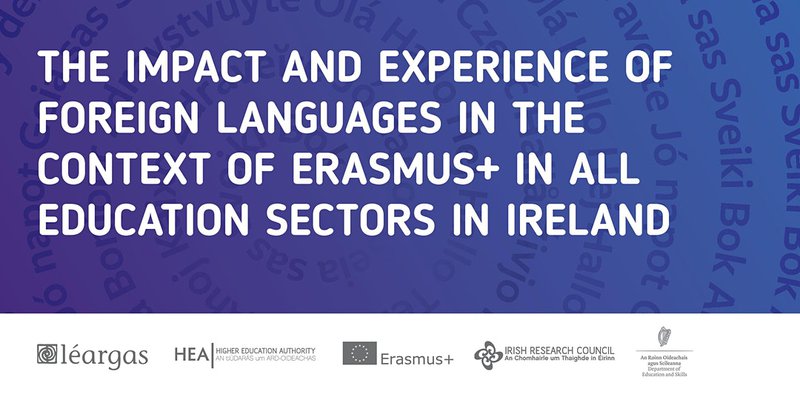The Impact and Experience of Foreign Languages in Erasmus+
Since it began in 2014, Erasmus+ has supported thousands of people around Ireland to train, exchange, study or get work experience in another European country. It’s difficult to encapsulate the breadth and diversity of experiences they’ve had. Taking part in Erasmus+ can mean a Higher Education student spending a year at a French university. However, it can also mean a Cork teacher job-shadowing classes in the Canary Islands, or a community group getting cutting-edge training for its staff in Italy and the Netherlands. While participants don’t have to speak the language of the country they visit, it’s clear that exposure to foreign languages and new language environments is an intrinsic part of the Erasmus+ experience.
Attitudes to Foreign Language Learning
We in Léargas worked together with our colleagues in the Higher Education Authority – who manage Erasmus+ at Higher Education level - to understand how this exposure to foreign languages has influenced attitudes to language learning in Ireland. This was particularly important in the context of the Government Strategy for Foreign Languages, Languages Connect, which has among its aims to “increase awareness of the importance of language learning to encourage the wider use of foreign languages”.
We co-commissioned research through the Irish Research Council and were delighted to be connected with Dr. Britta C Jung from University College Dublin. Dr. Jung has a strong humanities and languages background. She is also a highly mobile person herself having studied in Germany, the Netherlands and Ireland.
Britta applied her expertise and her interest in the subject to produce a comprehensive and revealing study. Indeed, the findings were quite unique in considering all fields of Erasmus+: Adult Education, Higher Education, School Education, Vocational Education and Training, and Youth.

Foreign Language: Exposure and Impact Findings
The study examines participants’ experience of this exposure to foreign languages, and the impact it has on them. It is based on more than 600 survey responses from former, current and future Erasmus+ participants, and 19 in-depth interviews with former participants and project co-ordinators. The research group came from a variety of organisations, spread across Ireland. The project co-ordinators had varying degrees of experience with Erasmus+ and the participants travelled to a wide range of countries.
Among the key findings are that taking part in an Erasmus+ mobility:
- Facilitates an engagement with other languages in more informal, unregulated settings, shifting the focus from an exam-based learning culture to a communicative one
- Leads to reduction of ‘language anxiety’ and increases the learners’ linguistic confidence, including a willingness to make mistakes
- Increases the likelihood of participants working in an international context or seeking opportunities abroad
- Can have a fundamental impact on the social and cultural integration of minority groups, including the Traveller community.
Community Empathy and Language Simplification
The research also showed that taking part fostered a sense of ‘communicative empathy’, even when the Erasmus+ participants from Ireland did not speak another language. The experience helped them to understand the difficulties of the communicative gap. It also highlighted the part they had to play in bridging it.
As one teacher said of her students, “They have so much more writing and presentations to do all the time with these Erasmus+ projects. They’re presenting for non-English speakers, so often they think, “Can I make it simpler?” They’re simplifying their own language. We often ask them, “If you were reading something in a foreign language, would you want a long bit or just a short bit?” So, they take a big text and they learn to summarise it to make it easier for people.”

Attitudes to Irish Language and Culture
Another perhaps unexpected finding was that taking part in a mobility project to another European country led to participants re-examining their attitude to Irish. A case in point was a group of young Irish people on an exchange to Romania, who found themselves ‘embarrassed’ not to speak Irish:
“Then the subject of Irish came up. The Romanian group were asking why they don’t speak Irish: “that’s your national language”. But we were saying that’s not the case for most people. They were horrified.
I would say the Irish group got quite emotional, but at the same time, kind of let down because they couldn’t say, “Yeah, we do know this language,” or even the national anthem. It’s in Irish. The Romanians sang their national anthem, and we played ours off YouTube, because we didn’t know it. They felt quite embarrassed in terms of culture, so they said next time they’re learning the national anthem. So, that’s something that is really small and funny, but it had a huge effect on them. It’s a comparison of how you value culture and traditions, and the language of your country.”
Erasmus+ Projects and Foreign Languages
We hope the study will inform future Erasmus+ projects, and encourage participants to discover the joy of languages – even when they don’t yet speak them.
You can now download the complete study from our Resources section. Alternatively, you can watch Britta present the highlights of the study at the recent online launch.
We welcome contributions to ‘Insights’ at comms@leargas.ie
